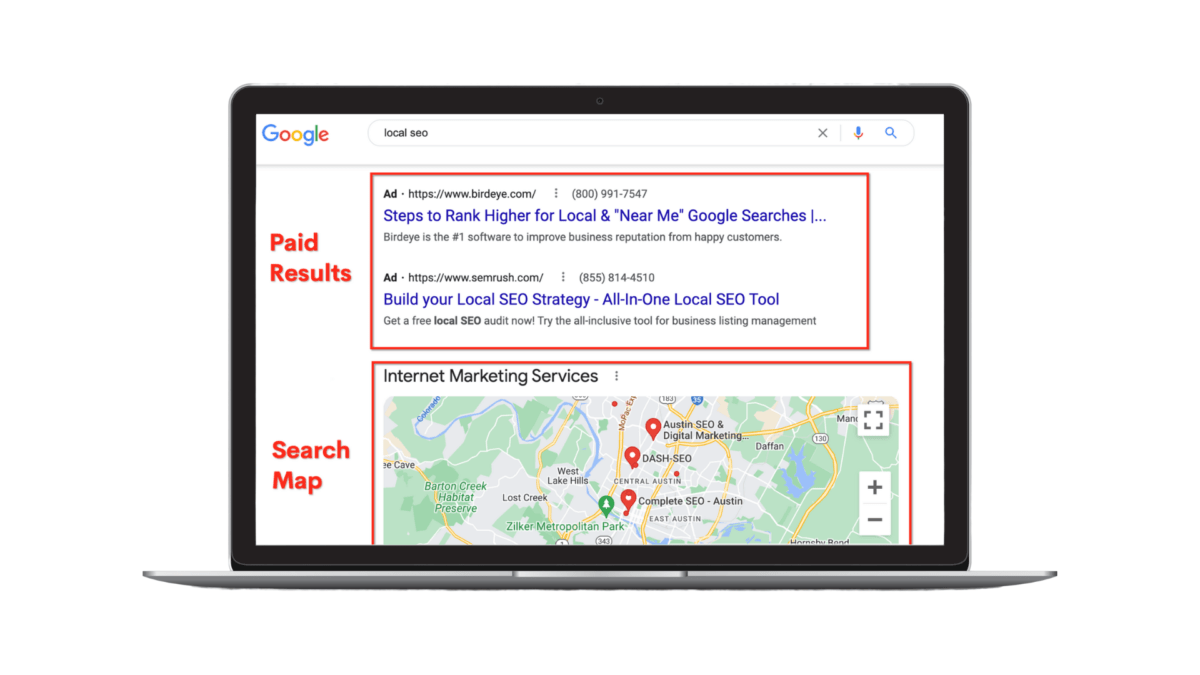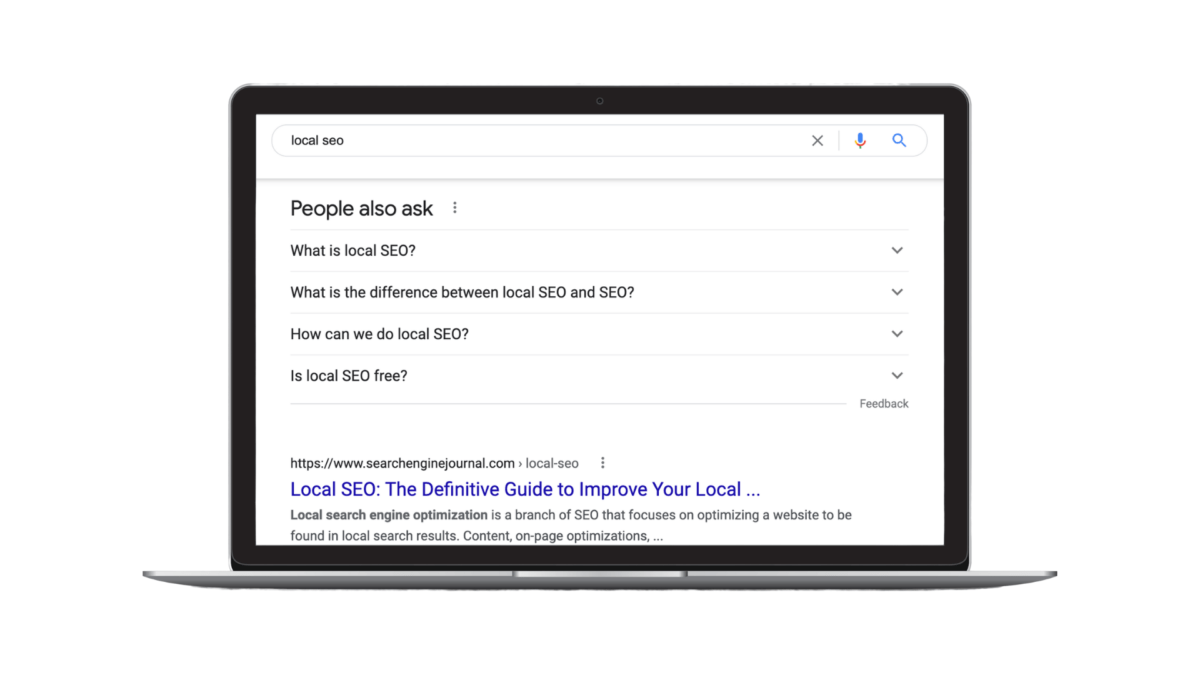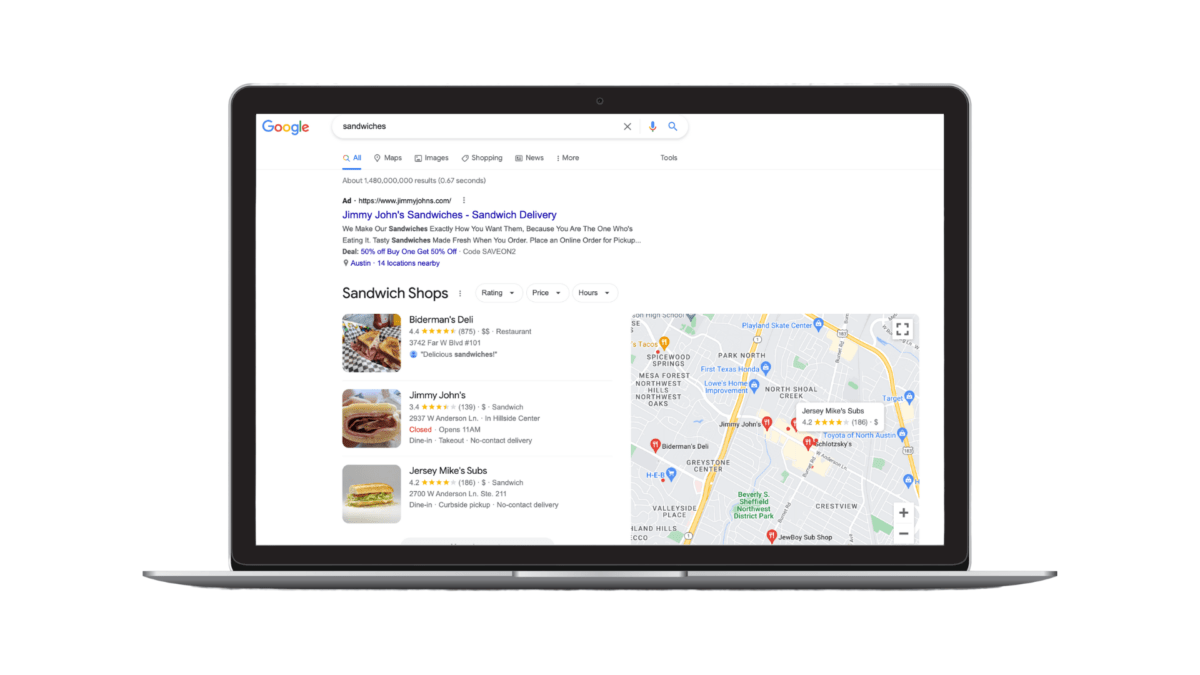What Is a SERP in SEO?
A search engine results page (SERP) is the list of results that a search engine, like Google, returns when someone searches for a specific keyword, phrase, or query.
The search engine results page (SERP) often includes a mix of organic search results, paid results, maps, featured snippets, and sometimes video results. For instance, the SERP for the search term “local SEO” shows several paid results or search advertisements along with a map of SEO businesses around Austin, TX, the location where the search took place.
Scrolling down further, you get the “people also ask” box, which Google uses to help quickly answer online users’ questions. Then, you’ll see the organic results that naturally rank on the SERP.
Why the SERP Matters
The higher your website or landing page is on the SERP, the more online traffic, clicks, visitors, and prospective customers you’re going to receive. Think about it, how often do you go past the first few results, let alone to page two when searching for something?
According to stopwatch.io, more than sixty-seven percent of clicks on SERPs go to the top five results. With more companies putting money behind paid search advertisements, it’s difficult to be noticed.
In order to rank higher on the SERP, you might wonder if you should start going after keywords or search terms that no one else is ranking for. That’s a possibility. However, most of those queries have very little search volume behind them — meaning no one’s searching for them so you won’t get new page visitors or leads.
Depending on the query, Google and other search engines will return anywhere from millions of pages or, in some cases, only a few no matches.
The SERP and Local SEO
To rank higher on the SERP, multi-location businesses need to focus not only on general search but on local search and SEO as well. Google and other search engines are making local search a top priority because that’s what consumers want when researching businesses. Ninety-one percent of consumers use search to find business information locally.
Below is an example of a search for “sandwiches” on Google Chrome. The results first show an advertisement and the Google 3-Pack. This emphasizes the importance for multi-location businesses to get their local listings in the Google 3-Pack.
Multi-location businesses must get as many business listings and Google Profiles in the 3-Pack as possible. The ROI is heavily worth the investment.
According to our 2022 Localized Marketing Benchmark Report (LMBR) — where we analyzed 100 metrics related to search, social, and reputation factors across hundreds of multi-location businesses — we found that businesses in the 3-Pack receive 126 percent more traffic and 93 percent more actions (calls, website clicks, and driving directions) than businesses ranked 4-10.
How to Rank in the Local SERP
Below are four ways to help your multi-location business rank in the local SERP for non-branded search terms, which are searches that don’t specifically mention your brand name.
- On-page SEO: Optimize your on-page SEO, which includes adding internal links across your pages, updating your URL structure, and adding a meta description to pages.
- Off-page SEO: Improve your off-page SEO by increasing your brand mentions and backlinks to your local landing pages. It also involves optimizing your Google Business Profile (GBP) and fixing your citations.
- Keywords: Include relevant product or service keywords across your website and local landing pages. You can also put keywords in your GBP landing page titles and headers.
- Review response: Respond to first (Google) and third-party reviews (Yelp, TripAdvisor, Facebook, etc.) In 2021, reviews accounted for 17 percent of your business’s ability to rank in the 3-Pack and Local Finder.
For more information on how your local businesses can rank in the SERP, read our blog post on local SEO ranking factors. If you’re having difficulty optimizing and managing your local listings, consider using SOCi Listings. SOCi Local Pages can also help manage your multi-location business’s local pages and ensure a strong local presence.


